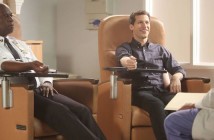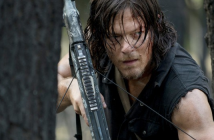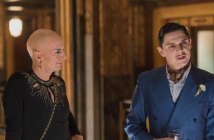November 21, 2015, 8:00 p.m. (EST), BBC
First she was a Dalek who thought she was a human. Then she was a bar maid who could pass as a governess. Then she was an Impossible Girl. She was many, many things before we finally got to see who Clara Oswald really was. If Peter Capaldi holds the role of The Doctor for many, many more seasons, chances are slim he will ever have a more iconic companion than Clara Oswald. Over the course of his first two series in the role, Clara transformed from a cipher who was whatever the script needed, a mystery box at the center of Doctor Who, into something far more interesting and even astonishing: an actual character, and one of the most complex in the history of the program.
Clara’s arc involved her learning the true nature of The Doctor and the true nature of herself, and becoming more and more Doctor-like as she travelled. Clara didn’t just become human in the way every (half-decent) companion on this show eventually does. She became, to me at least, something more interesting, more complex, and more rewarding. She became a great character, one capable of real moments of pathos and growth, one who evolved and devolved, who made good and bad decisions, who was brave and reckless, clever and stupid. She became a human being. From her elliptical first date with Danny Pink in “Listen,” through her righteous fury in “Kill the Moon” and her tragic self-destruction in “Mummy on the Orient Express,” to her beautiful lie in “Death in Heaven” and her peaceful “final” moments in “Last Christmas,” the Clara Oswald of the Capaldi era is one of Doctor Who’s all-time great creations. And “Face the Raven” is a proper send-off, one that reminds us of all that was great and terrible within Clara, and why she was so very important to this Doctor at this time.
Taken at face value, the episode is incredibly, almost nonsensically convoluted. Ashildr frames Rigsy for murder to attract The Doctor’s attention, only to basically trick him into shoving his hand into a hole (a thing I feel like The Doctor would just do if a hole were lying around near him without any prodding whatsoever). Yet it is impossible to approach “Face the Raven” in anything other than an emotional way, and from this perspective, it is phenomenally successful. Capaldi is at his portentous best, killing it with the big speeches he has to give about the trap street and the threat they are likely to face there. He’s also the funny alien who doesn’t remember anybody’s name because he pretends to be too preoccupied to care, and the raw nerve who feels far more than he can ever show. It’s a tour de force performance from a Doctor who brings his A-game nearly every week, but this is not Capaldi’s show.
No, the day belongs to Jenna Coleman, who fills her final scene with such a range of emotions, such a graceful resignation and understated terror that it is entirely captivating. As a Doctor Who fan, my first impulse is always to compare a big exit to similar ones elsewhere in the series history, to try to fit Clara’s swan song into a hierarchy of companion departures and make sense of it by examining how it relates to others. But “Face the Raven” almost demands that Clara’s death be taken on its own terms. It frames her exit as her choice, her reckless abandon as a sort of death wish that has chased her for a long, long time (I’d argue since even before she lost Danny). Clara isn’t stolen from The Doctor by fate, or by a time paradox, or even by Ashildr’s dispassionate scheming. No, she dies because of the way she lived. She took a big risk, and for once, it didn’t pay off. We all knew it would end this way deep down, knew it even before the show started beating us over the head with how dangerous Clara could be when The Doctor didn’t keep a close watch. At times, that whole line of thought struck me as deeply paternalistic, but Clara herself rebuffs that idea here. She didn’t die because The Doctor wasn’t watching out for her. She died because she chose to live in a way that guaranteed she wouldn’t last forever.
“Face the Raven” is swallowed a bit by its climax, but everything that precedes it is cleverly written and wonderfully staged. After the train wreck that was “Sleep No More,” it’s great to see the show bounce immediately back into top form with an episode that knows what beats to hit and hits them with a genuine sense of wonder. This is Sarah Dollard’s first Doctor Who script, and it’s the sort of thing that makes me hope very much that it won’t be her last. She intuitively grasps how to write The Doctor in all of his facets, and how to approach the material in ways that keep everything moving along at a thrilling pace. This isn’t a format-breaking episode, nor a complete masterpiece of a particular form of the show, it’s just a very well done story onto which is super-imposed one of the biggest events of the season (for a counterpoint, look to how Catherine Tregenna struggled earlier this season to make the story she wanted to tell in “The Woman Who Lived” fit into her conception of a standard Doctor Who episode where an alien invasion has to be foiled or everyone is disappointed). When it needs to work, “Face the Raven” works as well as just about anything this season, juggling several premises and a lot of plot weight incredibly deftly. It’s great work from all involved, and as a stealth beginning to the finale, its intriguing to say the least. The episode isn’t perfect, but it does all of its big moments well, which is all that can be asked from an episode killing a major character, sitting up the culmination of a season-long arc, featuring two semi-prominent returning characters, and also struggling to have a story. Tonight, Clara faced the raven. Next week, The Doctor will face whatever is waiting for him in that foreboding castle. For now, though, we are left to contemplate the Impossible Girl. We watched her run. But in the end, we watched her stand still, be brave, and die like she meant it. We watched her face the raven. And it was a thing to behold.
The Roundup
- “Did you make this human?”
- “Ok, local knowledge, you’re coming with us. And bring the new human. No, don’t bring the new human, I’ll just get distracted.”
- “You’re gonna save me. You’re a Doctor, that’s what you do.”
- “She enjoyed that way too much.” “Tell me about it. It’s an ongoing problem.”
- “Forget the way you usually look at the world. This street’s going to be hiding in plain sight.”
- “Ashildr?” “That’s your name. I keep telling you that.” “Do you? Infinite lifespan, finite memory. It makes for an awkward social life.”
- “Still saving the world from me then?” “It’s still here, isn’t it?”
- “Don’t worry, we’re perfectly safe.” “Yes, a phrase I find is usually followed by a lot of screaming and running and bleeding.”
- “This is putting you in danger!” “No, this is us talking the opposition into their own trap. This is Doctor 101.”
- “So this is your life, eh? Just traveling around time saving people?” “No, not every day. Sometimes Jane Austen and I prank each other. Ugh, she is the worst; I love her. Take that how you like.”
- “When I look at you, I can’t tell your past from your future, and there’s so very much of both.”
- “We can fix this, can’t we? We always fix it…”
- “Well, if Danny Pink can do it, so can I.” “Do what?” “Die right. Die like I mean it. Face the Raven.”
- “I should’ve taken care of you!” “I never asked you to.” “You shouldn’t have to ask.”
- “You don’t be a warrior. Promise me. Be a Doctor.”
- “Everything you’re about to say, I already know. Don’t do it now. We’ve already had enough bad timing.”
- “Don’t run. Stay with me.”
“Face the Raven” works as well as just about anything this season, juggling several premises and a lot of plot weight incredibly deftly.
-
GREAT




